

This collection consists of 2 parts; namely, what stress means to emerging adults aged between 18 to 25 - in the context of developed countries - and how they can cope with stress effectively.
Note: Please refer to the comments section in every item for more content and personal input.
1. Definition of 'Stress'
Stress generally refers to two things: the psychological perception of pressure, on the one hand, and the body's response to it, on the other, which involves multiple systems, from metabolism to muscles to memory.
Comment 2: According to this web page, 'stress' is essentially one's psychologically perceived pressure and the individual's body response to it. Although stress is absolutely normal and has advantages such as motivating individuals to accomplish certain tasks or meet certain goals, too much of it may overwhelm a person and lead to negative effects on the individual's physical, emotional and mental health; such as developing health conditions and/or mental illnesses. – sylviatan
Some stress is necessary for all living systems; it is the means by which they encounter and respond to the challenges and uncertainties of existence.
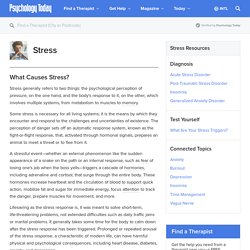
The perception of danger sets off an automatic response system, known as the fight-or-flight response, that, activated through hormonal signals, prepares an animal to meet a threat or to flee from it. A stressful event—whether an external phenomenon like the sudden appearance of a snake on the path or an internal response, such as fear of losing one's job when the boss yells—triggers a cascade of hormones, including adrenaline and cortisol, that surge through the entire body. 2. Impact of Stress on the Body.
3. Relationship Between Stress and Mental Health. Like most websites, we use cookies.
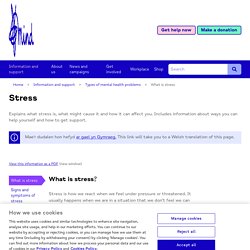
If this is okay with you, please close this message. read more about your options. If this is okay with you, please close this message. If not, please read more about your options. Menu. 4. Five Things One Should Know About Stress. 5. Common Symptoms of Stress. Stress affects us all.
Comment 1: Please click on the page shown to view the full web page. – sylviatan
You may notice symptoms of stress when disciplining your kids, during busy times at work, when managing your finances, or when coping with a challenging relationship.
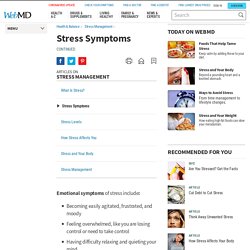
Stress is everywhere. And while a little stress is OK -- some stress is actually beneficial -- too much stress can wear you down and make you sick, both mentally and physically. 1. Background Information on Target Audience: Jeffrey Arnett's 5 Features of Emerging Adulthood. 2. Implications of the Emerging Adulthood Life Stage on One's Mental Health.
Comment 2: In my next 2 notes, I will share more about my real-life personal experiences and that of my peers with this life stage, which also demonstrates what this journal article has highlighted. – sylviatan
3. Real-life Personal Stressful Experience with the Emerging Adulthood Life Stage. 4. Real-life Stressful Experiences of Peers with the Emerging Adulthood Life Stage. 5. More About What Stress Is to Emerging Adults. For much of human history, the idea of adolescence being a distinct life stage was nonexistent.
Comment 2: Personally, I feel that this publication mentioned common stressors emerging adults face in developed countries, whereby most emerging adults are pre-occupied - and therefore, stressed by - education, career and/or love. They are also aligned with what I have learned in modules relating to young adults, as well as what I have seen in a few of my internship stints whereby I got to work with emerging adults. These stressors include: 1. Stress stemming from the use of social media - Comparing oneself to friends who seem/are portrayed to be more happy and successful on social media - Developing unrealistic expectations about body image due to celebrity photos, which are heavily edited using photoshop 2. Stress relating to academic performance - Increasing pressure to succeed; perhaps due to expectations inflicted by themselves, their environment and the society at large - How anxiety induced from this pressure interferes with their abilities to achieve – sylviatan
True, in the Middle Ages, children were recognized not merely as “mini” adults but as distinct beings with different needs.
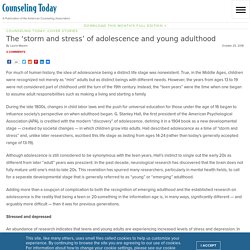
However, the years from ages 13 to 19 were not considered part of childhood until the turn of the 19th century. Instead, the “teen years” were the time when one began to assume adult responsibilities such as making a living and starting a family. During the late 1800s, changes in child labor laws and the push for universal education for those under the age of 16 began to influence society’s perspective on when adulthood began. G. Although adolescence is still considered to be synonymous with the teen years, Hall’s instinct to single out the early 20s as different from later “adult” years was prescient.
6. Common Causes of Stress in Emerging Adulthood. What causes stress in young adults?
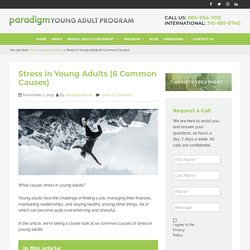
Young adults face the challenge of finding a job, managing their finances, maintaining relationships, and staying healthy among other things. 1. Effective Coping Strategies (Part 1) While it may seem like there’s nothing you can do about stress at work and home, there are steps you can take to relieve the pressure and regain control.
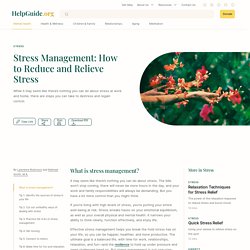
Why is it so important to manage stress? If you’re living with high levels of stress, you’re putting your entire well-being at risk. Stress wreaks havoc on your emotional equilibrium, as well as your physical health. It narrows your ability to think clearly, function effectively, and enjoy life. 2. Effective Coping Strategies (Part 2) 3. Effective Coping Strategies for School Stress.
Comment 1: I find this infographic useful as it includes the coping methods that real-life students have found effective in helping them cope with academic stress. They are common coping methods that my peers and I have used; such as exercising, rewarding ourselves for studying, putting away distractions such as our phones during study sessions, making plans of each day's work and doing work bit by bit to avoid feeling overwhelmingly stressed by piled-up work. – sylviatan
7. Coping Methods Commonly Used by Undergraduate Students. 4. Effective Coping Strategies for Work Stress. 5. Effective Coping Method: Treatment, Therapy and Medication. Like most websites, we use cookies.
Although there may be the existing issue of social stigma, seeing a professional for treatments such as therapy and/or medication has proven to be effective, especially for individuals who are facing high levels of stress that have already resulted in negative effects on their health; regardless of physical or mental. As mentioned, therapy can help one to have more awareness and better understand his/her thoughts and feelings, recognising his/her triggers and coming up with an action plan with the help of someone else - and not just anyone but a trained professional - whose thoughts and judgements would most likely not be clouded by negative emotions perceived by the client. Personally, I have found therapy to be helpful in managing stress and I also know of many friends and clients from my internship stints who have similarly found therapy to be helpful. Medication can also be helpful to manage one's biological/physiological causes and symptoms of stress. – sylviatan
If this is okay with you, please close this message. read more about your options.

If this is okay with you, please close this message. If not, please read more about your options. Menu. 6. Relaxing and Soothing Music for Stress Relief.